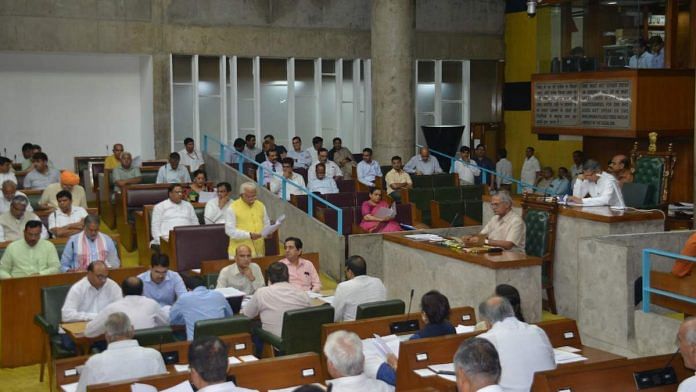Chandigarh: A stringent Act that empowers the police to deal with the underworld and organised crime in Maharashtra has been adopted almost verbatim by Haryana to deal with gangsters.
The state assembly passed the Haryana Control of Organised Crime Act (HCOCA) on 6 August in the last session of its current term. The Act provides unbridled powers to the state police to handle organised crime syndicates, drug cartels and the underworld.
Apart from Maharashtra and Haryana, the other states that have adopted this Act are Gujarat, Delhi, Uttar Pradesh, Karnataka, and Andhra Pradesh. These states, however, have their own versions of the law.
While the original idea behind such a stringent law was to tackle highly organised underworld criminals with international linkages, transnational smuggling and international drug cartels, Haryana will use the Act to deal with gangsters.
According to the Haryana Police, there are over 400 criminals involved in organised gang activities in the state, and 20 of these dreaded gangsters are “masterminds” or gang leaders.
Powers under the Act
An officer of the rank of a deputy inspector general or above will be able to invoke provisions of the HCOCA after citing why the crime cannot be covered under the Indian Penal Code alone.
The HCOCA puts the onus of proving innocence on the accused, i.e. special courts under the Act will presume that the accused has committed the crime until proven innocent. Court proceedings can be held in camera under this Act.
It provides for stricter punishment and fines, including the death penalty. It empowers the police to intercept phones and use all electronic material collected as evidence in the courts.
Under the Act, confessions made by a criminal before a superintendent of police are also admissible as evidence in court.
The Act also gravely tightens bail provisions for the accused. In case an accused who is out on bail commits another crime, he cannot apply for bail any further.
Also read: With no opposition leader, last assembly session to be cakewalk for Haryana’s BJP govt
Changing nature of crime
The statement of objects and reasons given in the assembly stated that the pattern of crime in Haryana was changing.
“While earlier, heinous crimes such as murder, dacoity, robbery kidnapping and extortion were committed by individuals acting alone or in concert, the last decade has witnessed the rise of gangsterism and organised crime in Haryana. Gangs of new age criminals have started pursuing a life in crime as well as organised criminal enterprise,” the Manohar Lal Khattar-led BJP government stated.
“Organised criminal gangs operating in certain districts of Haryana have established a well-organised network of criminals including shooters, informers, spotters, and arms suppliers. Properly structured, with well-defined membership and hierarchy, these gangs are primarily focused on contract killing and extortion from businessmen, smuggling of drugs protection rackets.”
The Haryana Police is struggling to get the custody of Gurugram’s most dreaded gangster, Kaushal, who was arrested by the Dubai police recently. Considered to be the new face of the underworld in Haryana, Kaushal jumped parole in 2016 and managed to leave India. He has over 50 members in his gang, and six of them are sharpshooters.
Last year, a member of the dreaded Manjeet Mahal gang operating in Faridabad managed to escape from custody when he was being taken to a doctor for treatment. The gangster, Vikas Dalal, was helped in the escape by two of his accomplices, who opened fire near the hospital.
Objections to the Act
Congress MLA Karan Dalal led the objections to the Act in the assembly, saying the state government was paving the way for or not just unbridled powers to the police, but also corruption.
“Each clause in the Act empowers a certain level of police official, which basically means corruption will increase at that level,” Dalal said in the House.
He said an Act this strong was required only in states dealing with a different kind of crime. “States which have similar Acts have changed the provisions to suit their requirements. They are not just cut-and-paste Acts,” Dalal told mediapersons later. He said the Haryana Act was also first mooted in 2016, but was kept pending since better sense had prevailed.
“But now when the government is just going out of power it is pushing through such controversial legislations,” he said.
‘Will be used sparingly’
Navdeep Virk, Haryana’s ADGP (Law and Order), assured that the Act would be used sparingly.
“There is no specific number of crimes that can be envisaged to be tackled under HCOCA. It’s an Act that empowers the police to tackle with serious organised crime,” he said.
“HCOCA would be used sparingly in cases where the police feels that the Act needs to be invoked. It’s not that thousands of cases would be registered under HCOCA. There are several inbuilt safeguards in the Act that ensure it is not misused.”
The law in other states
Maharashtra was the first to pass the Act in 1999. Gujarat passed a similar Act in 2003, but it could not be implemented for over a decade awaiting Presidential assent following misgivings over its contentions provisions. A reworked version of the Act was passed by the state assembly in 2015, but this too was rejected by the President’s office.
The Maharashtra Act was adopted by the national capital territory of Delhi. UP, Karnataka, Andhra Pradesh have their own versions of the Act.
The Punjab government under the Shiromani Akali Dal-BJP alliance tried to push through the Punjab Control of Organised Crime Act in 2016, but the idea was shelved following protests from human rights organisations and civil society.
The Captain Amarinder Singh-led Congress government put the move on the backburner after coming to power in 2017. However, following a rap from the Punjab and Haryana High Court in May this year regarding gangsters, Punjab is all set to moot the idea once again.
Also read: Haryana CM Khattar didn’t say ‘bring girls from Kashmir’, but he sure found it funny



